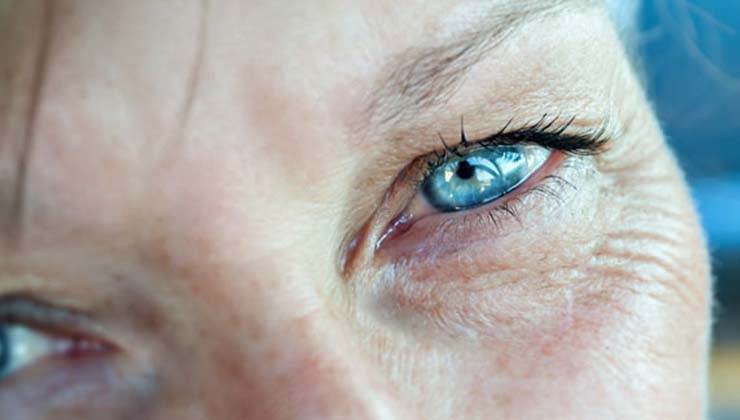Age and vision
12 de April de 2022
Age and vision
Eyesight is a key aspect for good quality of life, particularly in old age, and good or bad health has a direct impact on it. Different studies show that the over-60s are the demographic group with most visual health problems, some of which could lead to blindness if not diagnosed and treated in time. The main age-related eye disorders include cataracts, AMD, glaucoma and diabetic retinopathy. In addition to these disorders are other age-related visual problems such as presbyopia or tired eyes – which can appear after the age of 40–, floaters, dry eye, or corneal opacity.

Over-60s are the demographic group with most visual health problems
Prevention, the best strategy
You must look after your eyes in order to tackle these disorders, attempting to keep them in the best condition throughout your life. This will help find out which are the main age-related eyesight disorders, become aware of the importance of regular ophthalmic check-ups, be familiar with diseases such as diabetes, high blood pressure, hypercholesterolemia or heart disease, which have a direct impact on vision, and to adopt a series of essential healthy habits.
Eating a balanced diet, avoiding smoking and alcohol and taking physical exercise can help avoid many disorders or delay their appearance and improve their prognosis.

A balanced diet can help to avoid many eye disorders
Rules for good eyesight in later life
- Undergo full eye check-ups at least once a year.
- Eat a healthy, balanced diet rich in antioxidants and Omega 3.
- Do not smoke or stop smoking.
- Exercise in line with your individual characteristics and possibilities.
- Protect your eyes from the sun and from external agents (air, dust, sand, etc.)
- Monitor your blood pressure.
- Monitor your cholesterol levels.
- Monitor your blood glucose levels (especially diabetic patients)
- Check your own eyesight: keep up to date with check-ups, treatments and recommendations by your ophthalmologist.
- Do not resign yourself to vision loss due to age. There plenty yet to see!
Living longer… and better
As you age, the risk of developing significant eye diseases increases, all of which are particularly restrictive in later life as they reduce your capacity to adapt and visual problems are added to other age-related physical and mental conditioning factors. Poor vision in old age can cause falls, fear of going outside, and lack of contact with the environment, affecting one’s capacity to take part in social activities, and resulting in feelings of isolation and the onset of depression.

Eye health benefits from a healthy lifestyle
Another important factor to consider is that some of these diseases, such as AMD and glaucoma, are progressive and irreversible and are often symptomless, until they have reached advanced stages of development. Early detection and appropriate treatment can therefore prevent vision impairment and blindness. Consequently, frequent check-ups (every two years after the age of 40 and at least once a year after the age of 60 or if other major risk other factors exist, such as a family history, high myopia or chronic diseases of the central nervous system) are essential.
Anyone, of any age, must remember that you must see a specialist in the event of the slightest warning, such blurred vision or vision impairment, in order to diagnose the cause of the problem and start the right treatment as soon as possible.
Given that it is highly likely you will suffer from some ocular disease in your lifetime, especially in later years, the best strategy is therefore one of prevention, looking after your eyesight from an early age through regular eye tests and a commitment to a healthy lifestyle. Because there’s still plenty to see!
IMO Institute of Ocular Microsurgery
Josep María Lladó, 3
08035 Barcelona
Phone: (+34) 934 000 700
E-mail: international@imo.es
See map on Google Maps
By car
GPS navigator coordinates:
41º 24’ 38” N – 02º 07’ 29” E
Exit 7 of the Ronda de Dalt (mountain side). The clinic has a car park with more than 200 parking spaces.
By bus
Autobus H2: Rotonda de Bellesguard, parada 1540
Autobus 196: Josep Maria Lladó-Bellesguard, parada 3191
Autobuses H2, 123, 196: Ronda de Dalt – Bellesguard, parada 0071
How to arrive at IMO from:
IMO Madrid
C/ Valle de Pinares Llanos, 3
28035 Madrid
Phone: (+34) 910 783 783
See map in Google Maps
Public transport
Metro Lacoma (líne 7)
Autobuses:
- Lines 49 & 64, stop “Senda del Infante”
- Line N21, stop “Metro Lacoma”
Timetables
Patient care:
Monday to Friday, 8 a.m. to 9 p.m.
IMO Andorra
Av. de les Nacions Unides, 17
AD700 Escaldes-Engordany, Andorra
Phone: (+376) 688 55 44
See map in Google Maps
IMO Manresa
C/ Carrasco i Formiguera, 33 (Baixos)
08242 – Manresa
Tel: (+34) 938 749 160
See map in Google Maps
Public transport
FGC. Line R5 & R50 direction Manresa. Station/Stop: Baixador de Manresa
Timetables
Monday to Friday, 09:00 A.M – 07:00 PM




